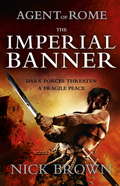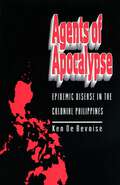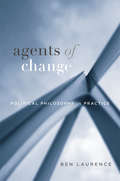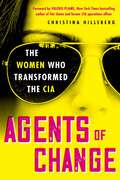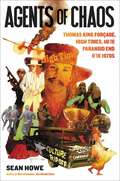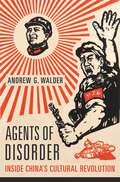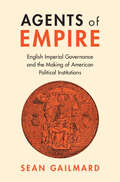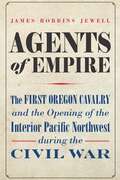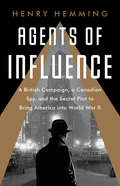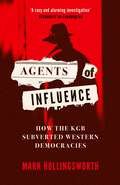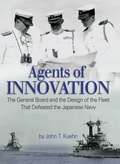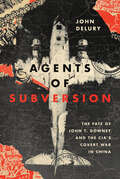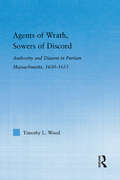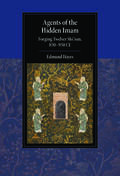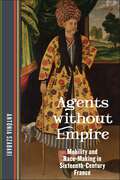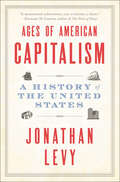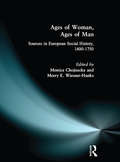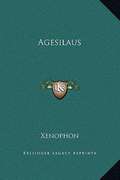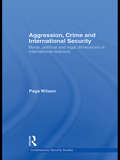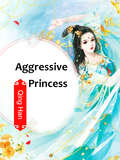- Table View
- List View
Agent of Rome: Agent of Rome 2
by Nick Brown272 AD The Roman Emperor Aurelian has defeated Queen Zenobia and crushed the Palmyran revolt. Faridun's Banner, hallowed battle standard of the Persian Empire, has fallen into Roman hands and is to be returned to the Persians as part of a historic peace treaty. But on the eve of the signing the banner goes missing. Recalled to Syria, imperial agent Cassius Corbulo is charged with recovering the flag. Accompanied by his faithful servant Simo and ex-gladiator bodyguard Indavara, Cassius must journey across the dangerous wastes of Syria to the equally perilous streets of Antioch. He and his companions face ruthless brigands, mysterious cults, merciless assassins and intrigue at every turn.
Agents of Apocalypse: Epidemic Disease in the Colonial Philippines
by Ken De BevoiseAs waves of epidemic disease swept the Philippines in the late nineteenth century, some colonial physicians began to fear that the indigenous population would be wiped out. Many Filipinos interpreted the contagions as a harbinger of the Biblical Apocalypse. Though the direct forebodings went unfulfilled, Philippine morbidity and mortality rates were the world's highest during the period 1883-1903. In Agents of Apocalypse, Ken De Bevoise shows that those "mourning years" resulted from a conjunction of demographic, economic, technological, cultural, and political processes that had been building for centuries. The story is one of unintended consequences, fraught with tragic irony.De Bevoise uses the Philippine case study to explore the extent to which humans participate in creating their epidemics. Interpreting the archival record with conceptual guidance from the health sciences, he sets tropical disease in a historical framework that views people as interacting with, rather than acting within, their total environment. The complexity of cause-effect and agency-structure relationships is thereby highlighted. Readers from fields as diverse as Spanish, American, and Philippine history, medical anthropology, colonialism, international relations, Asian studies, and ecology will benefit from De Bevoise's insights into the interdynamics of historical processes that connect humans and their diseases.
Agents of Bioterrorism: Pathogens and Their Weaponization
by Geoffrey ZubayThis new work offers a clear and thorough account of the threats posed by bioterrorism from the perspective of biologists. The authors examine thirteen disease-causing agents, including those responsible for anthrax, the plague, smallpox, influenza, and SARS. Each chapter considers a particular pathogen from the standpoint of its history, molecular biology, pathology, clinical presentation, diagnosis, weaponization, and defenses. The book also examines strategies for making vaccines and protecting the population in a bioterror attack.
Agents of Change: Political Philosophy in Practice
by Ben LaurenceAn incisive argument for the relevance of political philosophy and its possibility of effecting change. The appeal of political philosophy is that it will answer questions about justice for the sake of political action. But contemporary political philosophy struggles to live up to this promise. Since the death of John Rawls, political philosophers have become absorbed in methodological debates, leading to an impasse between two unattractive tendencies: utopians argue that philosophy should focus uncompromisingly on abstract questions of justice, while pragmatists argue that we should concern ourselves only with local efforts to ameliorate injustice. Agents of Change shows a way forward. Ben Laurence argues that we can combine utopian justice and the pragmatic response to injustice in a political philosophy that unifies theory and practice in pursuit of change. Political philosophy, on this view, is not a purely normative theory disconnected from practice. Rather, political philosophy is itself a practice—an exercise of practical reason issuing in action. Laurence contends that this exercise begins in ordinary life with the confrontation with injustice. Philosophy draws ideas about justice from this encounter to be pursued through political action. Laurence shows that the task of political philosophy is not complete until it asks the question “What is to be done?” and deliberates actionable answers.
Agents of Change: The Women Who Transformed the CIA
by Christina HillsbergThe timely and revelatory exploration of the pioneering women who changed the insulated world of international espionage—from the barrier-crashing challenges of the 1960s to the present day reckoning—told through the eyes of a former intelligence operative herself. Foreword by Valerie Plame, New York Times bestselling author of Fair Game and former CIA operations officer Years after her successful and impactful career at the CIA, Christina Hillsberg became enthralled with the stories of the trailblazing women who forged new paths within the Agency long before she began her career there in the aughts. These were women who sacrificed their personal lives, risked their safety, defied expectations, and boldly navigated the male-dominated spy organization. Through exclusive interviews with current and former female CIA officers, many of whom have never spoken publicly, Agents of Change tells an enthralling and, at times, disturbing story set against the backdrop of the evolving women&’s movement. It was the 1960s, a &“secretarial&” era, when women first gained a foothold and pushed against the one-dimensional, pop-culture trope of the sexy Cold War Bond Girl. Underestimated but undaunted, they fought their way, decade-by-decade, through adversity to the top of the spy game. Seamlessly weaving together the individual stories of these exceptional women, Hillsberg deftly tackles not just the fight for gender equality at the CIA, but the current dilemma the Agency faces when dealing with the culmination of a decades-long culture of sexual harassment and assault. Each chapter sheds a light on women&’s issues during that decade before bringing to life the stories of female CIA operations officers whose experiences were emblematic of that given era. In this fascinating and empowering chronicle, Hillsberg takes readers inside the Agency in a way that&’s never been done before, paying long overdue tribute to the survivors and thrivers, the indispensable groundbreakers, and defiant rabble-rousers who made the choice to change their lives and in turn, changed history.
Agents of Chaos: Thomas King Forçade, High Times, and the Paranoid End of the 1970s
by Sean HoweThe life and times of High Times&’ enigmatic founder Thomas King Forçade, an underground newspaper editor and marijuana kingpin who—between police raids, smuggling runs, and outrageous stunts—battled both the US government and fellow radicals.Cover illustration by legendary comics artist Bill Sienkiewicz. At the end of the 1960s, the mysterious Tom Forçade suddenly appeared, insinuating himself into the top echelons of countercultural politics and assuming control of the Underground Press Syndicate, a coalition of newspapers across the country. Weathering government surveillance and harassment, he embarked on a landmark court battle to obtain White House press credentials. But his audacious exploits—pieing Congressional panelists, stealing presidential portraits, and picking fights with other activists—led to accusations that he was an agent provocateur. As the era of protest faded and the dark shadows of Watergate spread, Forçade hoped that marijuana could be the path to cultural and economic revolution. Bankrolled by drug-dealing profits, High Times would be the Playboy of pot, dragging a once-taboo subject into the mainstream. The magazine was a travelogue of globe-trotting adventure, a wellspring of news about &“the business,&” and an overnight success. But High Times soon threatened to become nothing more than the &“hip capitalism&” Forçade had railed against for so long, and he felt his enemies closing in. Assembled from exclusive interviews, archived correspondences, and declassified documents, Agents of Chaos is a tale of attacks on journalism, disinformation campaigns, governmental secrecy, corporatism, and political factionalism. Its triumphs and tragedies mirror the cultural transformations of 1970s America, wrought by forces that continue to clash in the spaces between activism and power.
Agents of Disorder: Inside China’s Cultural Revolution
by Andrew G. WalderWhy did the Chinese Communist Party state collapse so rapidly during the Cultural Revolution? Consulting over 2,000 local annals chronicling some 34,000 revolutionary episodes across China, Andrew Walder offers a new answer, showing how the army, brought in to quiet brewing rebellions, escalated the violence that took nearly 1.6 million lives.
Agents of Empire
by Lisa ChiltonThe period between the 1860s and the 1920s saw a wave of female migration from Britain to Canada and Australia, much of which was managed by women. In Agents of Empire, Lisa Chilton explores the work of the women who promoted, managed, and ultimately transformed single British women's experiences of migration.Chilton examines the origins of women-run female emigration societies through various aspects of their work and the responses they received from emigrants and settled colonists. Working in the face of apathy in the community, resistance by other (usually male) managers of imperial migration, and agency exerted by the women they sought to manage, the emigrators endeavoured to maintain control over the field until government agencies took it over in the aftermath of the First World War. Agents of Empire highlights the aims and methods behind the emigrators' work, as well as the implications and ramifications of their long-term engagement with this imperialistic feminizing project. Chilton provides tremendous insight into the struggle for control of female migration and female migrants, aiding greatly in the study of gender, migration, and empire.
Agents of Empire: English Imperial Governance and the Making of American Political Institutions
by Sean GailmardTo understand the foundations of American political institutions, it's necessary to understand the rationale for British colonial institutions that survived the empire. Political institutions in England's American colonies were neither direct imports from England, nor home-grown creations of autonomous colonists. Instead, they emerged from efforts of the English Crown to assert control over their colonies amid limited English state and military capacity. Agents of Empire explores the strategic dilemmas facing a constrained crown in its attempts to assert control. The study argues that colonial institutions emerged from the crown's management of authority delegated to agents-first companies and proprietors establishing colonies; then imperial officials governing the polities they created. The institutions remaining from these strategic dynamics form the building blocks of federalism, legislative power, separation of powers, judicial review, and other institutions that comprise the American polity today.
Agents of Empire: The First Oregon Cavalry and the Opening of the Interior Pacific Northwest during the Civil War
by James Robbins JewellAgents of Empire expands the historiographical scope of Civil War studies to include the war&’s intersection with the history of the American West, demonstrating how the war was transcontinental in scope. Much more than a traditional Civil War regimental history, James Robbins Jewell&’s work delves into the operational and social conditions under which the First Oregon Cavalry Regiment was formed. In response to ongoing tensions and violent interactions with Native peoples determined to protect their way of life and lands, Colonel George Wright, head of the military&’s District of Oregon, asked the governor of Oregon to form a voluntary cavalry unit to protect white settlers and farmers. By using local volunteers, and later two additional regiments of infantry from the region, the federal government was able to draw from the majority of Regular Army troops stationed in the Pacific Northwest, who were eventually sent to fight Confederate forces east of the Mississippi River. Had the First Oregon Cavalry failed to fulfill its responsibilities, the federal government would have had to recall Union forces from other threatened areas and send them to Oregon and Washington Territory to quell secessionist unrest and Indigenous resistance to land theft, resource appropriation, and murder. The First Oregon Cavalry ensured settlers&’ security in the Union&’s farthest northwest corner, thereby contributing to the Union cause.
Agents of Influence: A British Campaign, a Canadian Spy, and the Secret Plot to Bring America into World War II
by Henry HemmingThe astonishing story of the British spies who set out to draw America into World War IIAs World War II raged into its second year, Britain sought a powerful ally to join its cause-but the American public was sharply divided on the subject. Canadian-born MI6 officer William Stephenson, with his knowledge and influence in North America, was chosen to change their minds by any means necessary.In this extraordinary tale of foreign influence on American shores, Henry Hemming shows how Stephenson came to New York--hiring Canadian staffers to keep his operations secret--and flooded the American market with propaganda supporting Franklin Roosevelt and decrying Nazism. His chief opponent was Charles Lindbergh, an insurgent populist who campaigned under the slogan "America First" and had no interest in the war. This set up a shadow duel between Lindbergh and Stephenson, each trying to turn public opinion his way, with the lives of millions potentially on the line.
Agents of Influence: How the KGB Subverted Western Democracies
by Mark HollingsworthThere&’s no such thing as a former KGB man. Agents of Influence reveals the secret history of an intelligence agency gone out of control, accountable to no one but itself and intent on subverting Western politics on a near-inconceivable scale. In 1985, 1,300 KGB officers were stationed in the USA. The FBI only had 350 counter-intelligence officers. Since the early days of the Cold War, the KGB seduced parliamentarians and diplomats, infiltrated the highest echelons of the Civil Service, and planted fake news in papers across the world. More disturbingly, it never stopped. Putin is a KGB man through and through. Journalist Mark Hollingworth reveals how disinformation, kompromat and secret surveillance continue to play key roles in Russia&’s war with Ukraine. It seems frighteningly easy to destabilise Western democracy.
Agents of Innovation
by John T. KuehnThe author examines the influence of the General Board of the U.S. Navy as an agent of innovation in the years between the world wars. A formal body established by the secretary of the Navy, the General Board served as the organizational nexus for the interaction between fleet design and the naval limitations imposed on the Navy by treaty. Particularly important, Kuehn argues, was the Board's role in implementing the Washington Naval Treaty, which limited naval armaments after 1922. Kuehn explains that the leadership of the Navy at large and the General Board in particular felt themselves especially constrained by Article XIX of the Washington Naval Treaty, which implemented a status quo on naval fortifications in the western Pacific.
Agents of Subversion: The Fate of John T. Downey and the CIA's Covert War in China
by John DeluryAgents of Subversion reconstructs the remarkable story of a botched mission into Manchuria, showing how it fit into a wider CIA campaign against Communist China and highlighting the intensity—and futility—of clandestine operations to overthrow Mao. In the winter of 1952, at the height of the Korean War, the CIA flew a covert mission into China to pick up an agent. Trained on a remote Pacific island, the agent belonged to an obscure anti-communist group known as the Third Force based out of Hong Kong. The exfiltration would fail disastrously, and one of the Americans on the mission, a recent Yale graduate named John T. Downey, ended up a prisoner of Mao Zedong's government for the next twenty years. Unraveling the truth behind decades of Cold War intrigue, John Delury documents the damage that this hidden foreign policy did to American political life. The US government kept the public in the dark about decades of covert activity directed against China, while Downey languished in a Beijing prison and his mother lobbied desperately for his release. Mining little-known Chinese sources, Delury sheds new light on Mao's campaigns to eliminate counterrevolutionaries and how the chairman of the Chinese Communist Party used captive spies in diplomacy with the West. Agents of Subversion is an innovative work of transnational history, and it demonstrates both how the Chinese Communist regime used the fear of special agents to tighten its grip on society and why intellectuals in Cold War America presciently worried that subversion abroad could lead to repression at home.
Agents of Wrath, Sowers of Discord: Authority and Dissent in Puritan Massachusetts, 1630-1655 (Studies in American Popular History and Culture)
by Timothy L. WoodThis book explores the authorities of Puritan Massachusetts balanced concern for the stability of the colony and the integrity of its Puritan mission with the hopes of reconciling dissidents back into the colonial community.
Agents of the Hidden Imam: Forging Twelver Shi‘ism, 850-950 CE (Cambridge Studies in Islamic Civilization)
by Edmund HayesIn 874 CE, the eleventh Imam died, and the Imami community splintered. The institutions of the Imamate were maintained by the dead Imam's agents, who asserted they were in contact with a hidden twelfth Imam. This was the beginning of 'Twelver' Shiʿism. Edmund Hayes provides an innovative approach to exploring early Shiʿism, moving beyond doctrinal history to provide an analysis of the socio-political processes leading to the canonisation of the Occultation of the twelfth Imam. Hayes shows how these agents cemented their authority by reproducing the physical signs of the Imamate, including protocols of succession, letters and the alm taxes. Four of these agents were ultimately canonised as “envoys” but traces of earlier conceptions of authority remain embedded in the earliest reports. Hayes dissects the complex and contradictory Occultation narratives to show how, amidst the claims of numerous actors, the institutional positioning of the envoys allowed them to assert a quasi-Imamic authority in the absence of an Imam.
Agents without Empire: Mobility and Race-Making in Sixteenth-Century France
by Antónia SzabariIt is well known that Renaissance culture gave an empowering role to the individual and thereby to agency. But how does race factor into this culture of empowerment? Canonical French authors like Rabelais and Montaigne have been celebrated for their flexible worldviews and interest in the difference of non-French cultures both inside and outside of Europe. As a result, this period in French cultural history has come to be valued as an exceptional era of cultural opening toward others. Agents without Empire shows that such a celebration is, at the very least, problematic. Szabari argues that before the rise of the French colonial empire, medieval categories of race based on the redemption story were recast through accounts of the Ottoman Empire that were made accessible, in a sudden and unprecedented manner, to agents of the French crown. Spying performed by Frenchmen in the Ottoman Empire in the sixteenth century permeated French culture in large part because those who spied also worked as knowledge producers, propagandists, and artists. The practice changed what it meant to be cultured and elite by creating new avenues of race- and gender-specific consumption for French and European men that affected all areas of sophisticated culture including literature, politics, prints, dressing, personal hygiene, and leisure.Agents without Empire explores race making in this period of European history in the context of diplomatic reposts, travel accounts, natural history, propaganda, religious literature, poetry, theater, fiction, and cheap print. It intervenes in conversations in whiteness studies, race theory, theories of agency and matter, and the history of diplomacy and spying to offer a new account of race making in early modern Europe.
Ages of American Capitalism: A History of the United States
by Jonathan LevyA leading economic historian traces the evolution of American capitalism from the colonial era to the present—and argues that we&’ve reached a turning point that will define the era ahead.&“The best one-volume history of American capitalism . . . It is impossible to understand the United States without understanding its economic history. This book, from one of the nation&’s foremost historians of capitalism, brings that important and endlessly fascinating story to life.&”—Sven Beckert, author of Empire of CottonToday, in the midst of a new economic crisis and severe political discord, the nature of capitalism in United States is at a crossroads. Since the market crash and Great Recession of 2008, historian Jonathan Levy has been teaching a course to help his students understand everything that had happened to reach that disaster and the current state of the economy, but in doing so he discovered something more fundamental about American history. Now, in an ambitious single-volume history of the United States, he reveals how, from the beginning of U.S. history to the present, capitalism in America has evolved through four distinct ages and how the country&’s economic evolution is inseparable from the nature of American life itself.The Age of Commerce spans the colonial era through the outbreak of the Civil War, a period of history in which economic growth and output largely depended on enslaved labor and was limited by what could be drawn from the land and where it could be traded. The Age of Capital traces the impact of the first major leap in economic development following the Civil War: the industrial revolution, when capitalists set capital down in factories to produce commercial goods, fueled by labor moving into cities. But investments in the new industrial economy led to great volatility, most dramatically with the onset of the Great Depression in 1929. The Depression immediately sparked the Age of Control, when the government took on a more active role in the economy, first trying to jump-start it and then funding military production during World War II. Skepticism of government intervention in the Cold War combined with recession and stagflation in the 1970s led to a crisis of industrial capitalism and the withdrawal of political will for regulation. In the Age of Chaos that followed, the combination of deregulation and the growth of the finance industry created a booming economy for some but also striking inequalities and a lack of oversight that led directly to the crash of 2008.In Ages of American Capitalism, Jonathan Levy proves that, contrary to political dogma, capitalism in the United States has never been just one thing. Instead, it has morphed throughout the country&’s history—and it&’s likely changing again right now.
Ages of Woman, Ages of Man: Sources in European Social History, 1400-1750
by Merry Wiesner Hanks Monica ChojnackaThe collection is organized around two main principles, stages of life and gender, and is divided into eight chapters: childhood, youth and sexuality, courtship and weddings, married life, economic life, networks and communities, and widowhood and old age. The sources address the numerous and varied ways in which women and men’s notions of themselves affected their lives, and explore how accepted norms of masculine and feminine behaviour influenced social, economic, and religious change. Guided by a general editors' introduction and then an introduction to each chapter, the user will find this an invaluable reference companion to early modern gender history.
Agesilaus
by XenophonDesigned to help motivate the learning of advanced calculus by demonstrating its relevance in the field of statistics, this successful text features detailed coverage of optimization techniques and their applications in statistics while introducing the reader to approximation theory. <P> <P> The Second Edition provides substantial new coverage of the material, including three new chapters and a large appendix that contains solutions to almost all of the exercises in the book. Applications of some of these methods in statistics are discusses.
Aggression, Crime and International Security: Moral, Political and Legal Dimensions of International Relations (Contemporary Security Studies)
by Page WilsonAggression, Crime and International Security examines the concept of aggression in international relations and how it has been dealt with by international law and collective security organisations. This book analyses the evolution of the concept of aggression in international relations from World War I to the post-Rome Statute era. It charts the emergence of two competing visions of this notion: on the one hand, as a triggering mechanism for collective security enforcement among states, and, on the other, as an international crime giving rise to individual responsibility. The author argues that despite certain contemporary international trends suggesting a shift away from traditional, state-centric power structures towards a more cosmopolitan, globalized polity, the history of the concept of aggression demonstrates just how far away this is in reality. By examining aggression in theory and practice at the League of Nations, the Nuremberg and Tokyo Trials, the United Nations, the conference establishing the Rome Statute, and beyond, the book reveals the recurring moral, political and legal challenges this concept poses - challenges which continue to be at the forefront of thinking about international relations today. This book will be of great interest to students of International Law, War Crimes, International Relations and Security Studies.
Aggressive Princess: Volume 1 (Volume 1 #1)
by Qing Hanonce through she became a humiliation will be killed by the poor princess and the dog worship hall soak in the pig cage poison assassination p p du jiuyue angry really really this reason too no natural reason with what you between the destruction of the crucial innocent woman s life p p du jiuyue refused come on the girl is not a vegetarian although you have countless schemes step by step this girl will not sit and wait for the death see the action what beg me to detoxify can ah a letter of divorce for my life freedom this girl give you detoxification he a nation proton body bear mother enemy originally want to recruit a detoxification holy hand do not want to be attracted to her deeply unexpectedly his life should be a beautiful intelligent beauty side by side
Aggressive Princess: Volume 2 (Volume 2 #2)
by Qing Hanonce through she became a humiliation will be killed by the poor princess and the dog worship hall soak in the pig cage poison assassination p p du jiuyue angry really really this reason too no natural reason with what you between the destruction of the crucial innocent woman s life p p du jiuyue refused come on the girl is not a vegetarian although you have countless schemes step by step this girl will not sit and wait for the death see the action what beg me to detoxify can ah a letter of divorce for my life freedom this girl give you detoxification he a nation proton body bear mother enemy originally want to recruit a detoxification holy hand do not want to be attracted to her deeply unexpectedly his life should be a beautiful intelligent beauty side by side
Aggressive Princess: Volume 3 (Volume 3 #3)
by Qing Hanonce through she became a humiliation will be killed by the poor princess and the dog worship hall soak in the pig cage poison assassination p p du jiuyue angry really really this reason too no natural reason with what you between the destruction of the crucial innocent woman s life p p du jiuyue refused come on the girl is not a vegetarian although you have countless schemes step by step this girl will not sit and wait for the death see the action what beg me to detoxify can ah a letter of divorce for my life freedom this girl give you detoxification .He a nation proton body bear mother enemy originally want to recruit a detoxification holy hand do not want to be attracted to her deeply unexpectedly his life should be a beautiful intelligent beauty side by side
Aggressive Princess: Volume 4 (Volume 4 #4)
by Qing Hanonce through she became a humiliation will be killed by the poor princess and the dog worship hall soak in the pig cage poison assassination p p du jiuyue angry really really this reason too no natural reason with what you between the destruction of the crucial innocent woman s life p p du jiuyue refused come on the girl is not a vegetarian although you have countless schemes step by step this girl will not sit and wait for the death see the action what beg me to detoxify can ah a letter of divorce for my life freedom this girl give you detoxification .He a nation proton body bear mother enemy originally want to recruit a detoxification holy hand do not want to be attracted to her deeply unexpectedly his life should be a beautiful intelligent beauty side by side
